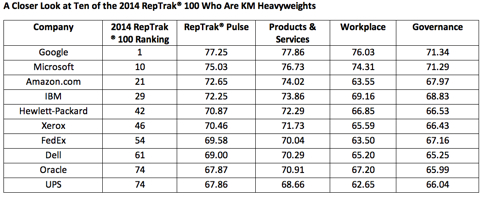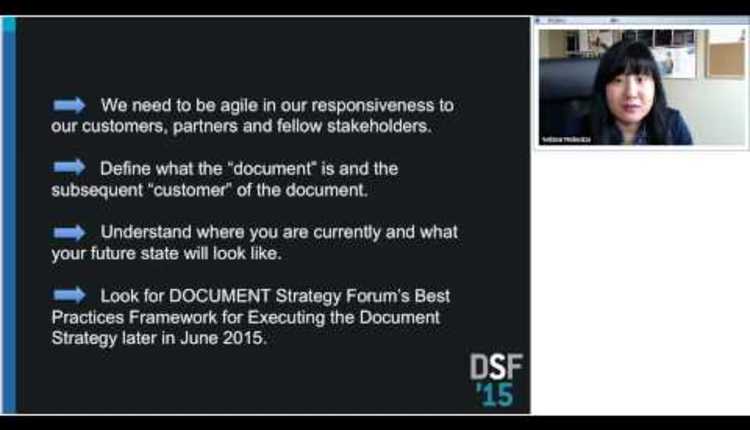
With the 2014 DOCUMENT Strategy Forum almost here, it is a good time to reflect on the state of document management inside large organizations. Consider the mission of the three-day event in Greenwich, CT in mid-May: “help enterprises do one thing: create, produce, deliver and manage better performing transactional/customer communication documents.”
If we all agree with the central premise of the DOCUMENT Strategy Forum that these documents (printed or electronic) are truly the single most important documents your company produces each year, then how are the most reputable companies in the world doing with the general public across the 15 largest markets in the world when it comes to making the company behind those products and services come to life?
Earlier this month, Forbes and Reputation Institute released the results of the largest global study of corporate reputation called the Global RepTrak® 100, and two of the top 10 companies (#1 Google and #10 Microsoft) have long been at the forefront of the knowledge management revolution. Scanning the rest of the list and cross-referencing against a comparable annual ranking (the 100 companies that matter in knowledge management), however, and only three other companies (#29 IBM, #61 Dell and #74 Oracle) have played leading roles in helping document management evolve from a strictly back office, cost reduction exercise to a front office strategic enabler around the world.
That is not to say that five other RepTrak® 100 stalwarts from 2014 (#21 Amazon, #42 HP, #46 Xerox, #54 FedEx and #74 UPS) haven’t changed the game, as e-commerce and digital business have rewritten the rules for customer service and employee engagement document excellence over the last two decades. What it does say is that 90% of the world’s most reputable companies enjoy a strong emotional bond with consumers that owes less to their transactional documents and more to how they connect to a sustainable shared vision for the future.
As I discussed in my March blog, corporate reputation is quantified and measured at the emotional or Pulse level (the amount of trust, admiration, good feeling and esteem) as well as the rational level (perceptions about Products & Services, Innovation, Workplace, Governance, Citizenship, Leadership and Financial Performance). Students and practitioners of corporate social responsibility (including the Boston College Center for Corporate Citizenship) have indexed CSR by analyzing perceptions of corporate performance around Citizenship, Governance and Workplace.
For simplicity sake prior to DOCUMENT Strategy Forum, let’s take a look at these 10 document-savvy companies–and 2014 RepTrak® 100 performers (in alphabetical order (Amazon, Dell, FedEx, Google, HP, IBM, Microsoft, Oracle, UPS and Xerox) in three critical dimensions that reflect knowledge management capabilities and performance: Products & Services, Governance and Workplace.

- In terms of Products & Services perceptions, only nine points separate #1 Google (77.86) from #10 UPS (68.66). Oracle has the #7 P&S reputation (70.91), which is a full three points higher than its Pulse score, which means consumers perceive the enterprise resource planning giant as more credible in what it sells than what it stands for.
- Looking at the Workplace dimension, Google and Microsoft both score well (mid-70s) and close to their Pulse scores, while Amazon (#8 at 63.55) is seen as having a weaker reputation as an employer than Oracle (#4 at 67.20) even though the Seattle retailer enjoys a Pulse score that is five points higher than Larry Ellison and company.
- When analyzing the Governance dimension, it is important to note that while Google and Microsoft remain at the head of the class with scores in the low 70s, FedEx moves into the top five at 67.16 even though only three points separate #3 IBM (68.83) from #10 Dell (65.25).
In a syndicated global study like this, the science of reputation measurement ends here and the art of reputation management begins. Which component parts of document management do you think play the biggest role in creating more reputation capital for the likes of Google and Microsoft and slightly less for FedEx and UPS with the general public around the world? Is it the more traditional IT integration/customer experience/CRM/project management perceptions, or perhaps the newer battlegrounds of Big Data/cloud services/mobile technologies/collaboration/social platforms? B2B decision makers certainly factor things like process metrics, document strategy, predictive analytics and information management into the equation, but the intersection of knowledge management and reputation management plays out for B2G and non-profit actors as well.

















